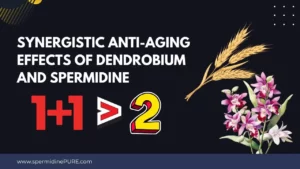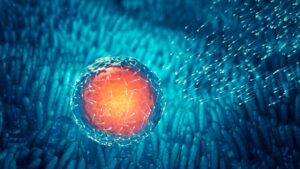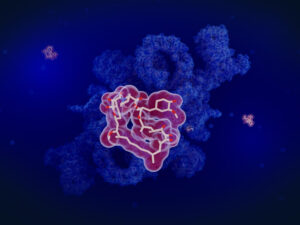When it comes to David Sinclair’s spermidine supplementation, you might be curious about why he decided to include this compound in his daily regimen. As an Australian biologist and a genetics professor at Harvard Medical School, David Sinclair is known for his research on human aging and contributions to the field of longevity. Recently, he has decided to experiment with spermidine and add it to his supplement stack, taking 1 mg daily in practice, although the recommended dosage is 1 gram daily (source).
Spermidine is a naturally occurring polyamine in the body that plays a crucial role in various cellular processes. It has gained attention for its potential benefits in promoting longevity and improving healthspan. Research suggests that it can impact aging mechanisms and might offer a promising intervention for age-related diseases (source).
As you explore the topic of spermidine supplementation and its potential role in supporting a healthier, longer life, this article will delve deeper into the science behind it, why David Sinclair has chosen to include it in his own personal supplement routine, and how it might benefit your health journey.
David Sinclair: A brief introduction to the renowned scientist
David Sinclair is a highly respected figure in the field of aging research. As a Professor in the Department of Genetics and co-Director of the Paul F. Glenn Center for Biology of Aging Research at Harvard Medical School, he has dedicated his career to understanding why we age and exploring ways to slow its effects. Born in Australia in 1969, Sinclair is now an Australian-American biologist and academic known for his cutting-edge research on aging and epigenetics.
During his time at Harvard, Sinclair has made significant discoveries that have advanced our understanding of the biology of aging. His work has been widely recognized not only within the scientific community but also among the general public. In addition to being an officer of the Order of Australia (AO), he maintains an active presence on social media platforms, such as YouTube, where he shares useful insights and knowledge on aging research.
Driven by his passion for understanding the aging process, Sinclair founded several biotech companies and accumulated numerous patents in the field. His pursuit of knowledge and commitment to advancing the field of aging research make him a highly sought-after expert in the area.
The Connection Between David Sinclair and Spermidine
David Sinclair, a renowned scientist, and expert in aging and longevity, has recently identified spermidine as a supplement with significant benefits for health and lifespan. Spermidine is a polyamine molecule present in the human body and certain whole foods, and it plays an essential role in many biological processes.
Consuming spermidine can trigger healthful effects in your body due to its ability to induce autophagy. This process adapts to stress and damage by repairing and rejuvenating cellular components. This is particularly important for supporting the healthy aging process as it helps maintain cellular health and vitality. You can find spermidine in various food sources, including blue cheese, soy, shellfish, and mushrooms (HealthNews).
Sinclair has become passionate about spermidine supplements based on their impressive health and anti-aging benefits. He has added the spermidine supplement to his regimen, undoubtedly recognizing its potential to enhance key biomarkers of longevity.
Some suggested benefits of spermidine include:
- Supporting a youthful appearance
- Promoting healthy skin, hair, and nails
- Enhancing cellular renewal
- Encouraging repair and rejuvenation of damaged cells
By following David Sinclair’s lead and incorporating spermidine into your health routine, you may experience improvements in overall well-being and possibly slow biological aging (Outliyr).
The Science of Aging and Longevity
In this section, we will delve into the research conducted by Dr. David Sinclair and his contributions to the field of aging and longevity. We will also discuss key cellular pathways and the role of genetics in the aging process.
David Sinclair’s Research
Dr. David Sinclair, a renowned scientist and professor in the Department of Genetics at Harvard Medical School, is at the forefront of aging research. He focuses on understanding the mechanisms behind aging and developing strategies to slow its effects (The Sinclair Lab – Harvard University) . A key aspect of his work revolves around studying sirtuins, a family of proteins regulating cellular health. These proteins play a critical role in maintaining the balance between energy production and repairing cellular damage caused by oxidative stress.
Key Cellular Pathways
Two main cellular pathways are central to Dr. Sinclair’s research: sirtuin activation and autophagy. Sirtuins help maintain mitochondrial function, essential for energy production and overall cellular health. Increasing the activity of these proteins can potentially slow down aging and extend our lifespan.
On the other hand, autophagy is a process by which our cells recycle damaged components and maintain overall cellular health. This process declines with age, resulting in a buildup of damaged parts and ultimately contributing to aging. By enhancing autophagy, we can potentially slow down aging and increase longevity.
Some key players in these cellular pathways include:
- Sirtuins: A family of proteins that regulate numerous cellular processes such as DNA repair, inflammation control, and energy metabolism.
- Mitochondria: The cell’s powerhouse, responsible for producing energy and maintaining cellular function.
- Oxidative Stress: A damaging process that accumulates as we age, leading to a decline in cellular function and contributing to the aging process.
The Role of Genetics
Genetics plays a crucial role in determining our lifespan and susceptibility to age-related diseases. Although your genetics can predispose you to specific health conditions, emerging research suggests that the activation of certain genes, such as sirtuins, can have a positive impact on longevity and overall health. Dr. Sinclair’s research bridges the gap between genetics and aging by identifying genetic factors that influence cellular pathways and, in turn, contribute to the aging process.
Diet, Exercise, and Fasting Strategies
Dietary Recommendations
For maintaining optimal health and longevity, Dr. David Sinclair recommends a plant-based diet, low in sugar, pasta, and other starchy foods(source). Including spermidine-rich whole foods like wheatgerm, soybeans, nuts, and some fruits and vegetables in your diet can be a caloric restriction mimetic, simulating the health benefits of fasting without hunger(source). Experiment with different diets until you find the best for your body type.
Exercise and Physical Activity
Dr. Sinclair emphasizes the importance of regular exercise and physical activity to promote health and longevity. When working out, focus on deep, rapid breathing to increase oxygen in your bloodstream and boost caloric burn, which will help activate the Epigenetic clock(source). Exercise can also improve insulin sensitivity, reduce inflammation, and lower the risk of type 2 diabetes.
Intermittent Fasting
Incorporating fasting strategies can be beneficial for managing glucose levels and improving overall health. Dr. Sinclair and his colleague Matthew discuss three primary fasting methods: fasting-mimicking diet, intermittent fasting, and time-restricted feeding(source). The fasting-mimicking diet focuses on reducing mTOR activity by limiting the consumption of branched-chain amino acids, and the time window for eating is less rigorous in this approach. Intermittent fasting and time-restricted feeding can also help improve insulin sensitivity and reduce the risk of chronic diseases like type 2 diabetes. Experiment with these fasting strategies and adapt them to your lifestyle and body’s needs.
Supplements for Healthy Aging
Incorporating various supplements into your daily routine can offer numerous benefits in your quest for healthy aging. This section will discuss some of the most beneficial supplements, such as resveratrol, NMN, vitamins D3 and K2, and omega-3 fatty acids.
Resveratrol and Other Polyphenols
Resveratrol, a natural polyphenol found in grapes and red wine, has been shown to activate a cellular pathway that promotes longevity. Along with resveratrol, other polyphenols like fisetin and quercetin offer similar benefits. You may consider adding these potent antioxidants to your regimen to combat oxidative stress and support your overall health.
NMN and NAD+
Nicotinamide mononucleotide (NMN) and nicotinamide adenine dinucleotide (NAD+) are essential in cellular energy production and metabolism. Boosting your levels of these molecules can help maintain cellular health and promote longevity. High-dose supplementation of NMN has been suggested to increase NAD+ levels and improve age-related health issues.
Spermidine
Spermidine is a polyamine compound that promotes cellular autophagy and supports healthy neuronal function. Daily supplementation of spermidine can be beneficial for your overall health and supports healthy aging. Some popular spermidine supplements on the market include Longevity Labs’ spermidineLIFE and Oxford Healthspan’s Primeadine.
Vitamins D3 and K2
Both vitamin D3 and vitamin K2 play crucial roles in maintaining bone and cardiovascular health. Ensuring adequate intake of these vitamins can contribute to your overall well-being and longevity. A daily vitamin D3 and K2 supplement is a wise addition to your regimen for healthy aging.
Omega-3 Fatty Acids
Omega-3 fatty acids are essential nutrients with various health benefits, from supporting brain function to promoting a healthy heart. Including a high-quality omega-3 fish oil supplement in your daily routine can improve your overall health and longevity.
Additional Supplements
For further support in your healthy aging journey, consider adding supplements like alpha lipoic acid, a potent antioxidant, and coenzyme Q10, an essential molecule for cellular energy production. Both compounds have been linked to improved health and longevity, making them valuable additions to your regimen.
Pharmaceuticals and Their Potential Role in Aging
In addition to researching the effects of spermidine and other natural compounds, it’s essential to consider the potential role of pharmaceuticals in aging. Many commonly prescribed drugs may have anti-aging effects, and understanding their potential can help you make informed decisions about your health.
Metformin
Metformin is primarily prescribed for type 2 diabetes, but it has gained attention for its possible anti-aging effects. This medication has been shown to extend the lifespan of some organisms and may work by activating AMPK, an enzyme that controls cellular metabolism. By improving cellular health, metformin may reduce the risk of age-related diseases like cardiovascular disease.
Statins
Statins are a class of drugs used to lower cholesterol levels, reducing cardiovascular disease risk. They may also play a role in delaying aging. Statins reduce inflammation, and chronic inflammation is a key component of aging. In addition, statins can improve blood flow and support overall cardiovascular health.
However, the extent of their potential anti-aging effects is still unclear, as not all studies have consistently shown a correlation between statin use and increased lifespan. Speaking with your healthcare provider before starting or stopping any medications, including statins, is always recommended.
Aspirin
Aspirin is a commonly used anti-inflammatory medication linked to a reduced risk of age-related diseases. In particular, it is well-known for its ability to prevent blood clot formation and reduce the risk of heart attack and stroke.
Some studies suggest that long-term, low-dose aspirin therapy may provide additional benefits, such as reducing overall inflammation levels and potentially contributing to a slower aging process. However, aspirin therapy is not without risks, and you must consult your healthcare provider before starting any treatment.
Dr. David Sinclair’s Influence and Expertise
As an expert in aging and longevity, Dr. David Sinclair is known for shedding light on supplements and lifestyle choices that may help improve health and extend lifespan. One compound that has captured his attention and made its way into his own supplement regimen is spermidine.
YouTube and Media Presence
Dr. Sinclair utilizes platforms like YouTube to share his knowledge and findings with a broader audience. Through interviews and discussions, he provides insights into novel compounds and supplements that potentially promote health and longevity. His endorsement of spermidine, a polyamine found naturally in the body and certain whole foods, has helped spur interest in its potential health benefits and made it a popular topic among those seeking to improve their lifespan.
Noteworthy Publications
Dr. David Sinclair is a Professor in the Department of Genetics and co-Director of the Paul F. Glenn Center for Biology of Aging Research at Harvard Medical School. Drawing from his extensive research and experience, Dr. Sinclair has made significant contributions to understanding aging and its underlying mechanisms. His work has been published in numerous scientific journals and has been instrumental in enhancing the field of aging research.
By incorporating spermidine into his supplement stack and sharing this information through various media channels, Dr. Sinclair has contributed to the growing interest in spermidine’s potential benefits for health and longevity. As a respected authority in the field, his endorsement can influence researchers, healthcare professionals, and the general public in pursuing a healthier, longer life.
FAQ
Does Sinclair take spermidine?
Yes, Dr. David Sinclair includes spermidine in his supplement stack. Spermidine is a naturally occurring compound found in the human body and whole foods that has been shown to have health and longevity benefits.
Why did Dr David Sinclair add SPERMIDINE To His Supplement Stack?
Dr. Sinclair added spermidine to his supplement stack because it has been found to mimic the effects of fasting on the body and induce cellular renewal through autophagy. This can help protect against disease and even boost longevity.
What brand of spermidine does David Sinclair take?
Although specific brand information is not available, it’s important to choose a reputable and high-quality spermidine supplement when considering adding it to your regimen.
What’s david sinclair spermidine dose?
Dr. Sinclair’s exact dosage hasn’t been disclosed, however, he has reported taking 1 gram daily (in practice 1 mg) of spermidine.



